Banff Pork Seminar 2018 Aherne Prize winners tell their stories
Date posted: January 11, 2018
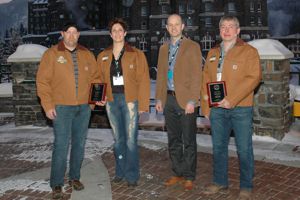
Two winners shared the F. X. Aherne Prize at the 2018 Banff Pork Conference. Left to right Lyle and Maaike Campbell, Birnam Pork, Arkona, Ont., Dr. Ben Willing, University of Alberta and Scott Hyshka, Mountain Vista / Sunterra Farms, Drumheller, Alta.
The winners of the 2018 F. X. Aherne Prize for Innovative Pork Production were announced at the Banff Pork Seminar, Jan. 9 to 11, Banff, Alta.
This year two winners shared the prize. Winner for what they term the "ghost gate" were Lyle and Maaike Campbell, Birnam Pork, Arkona, Ont. Winner for the loose housing pen-within-a-pen innovation was Scott Hyshka, Mountain Vista / Sunterra Farms, Drumheller, Alta.
The Aherne Prize has developed quite a reputation in the pork industry says Dr. Ben Willing, of the University of Alberta, chair of the Aherne Prize committee. He says the quality and number of applicants is strong each year.
"This prize recognizes individuals who have developed either original solutions to pork production challenges or creative uses of known technology," says Willing. "Innovation is a powerful word today in any industry and we are pleased at Banff Pork Seminar to acknowledge these grassroots innovations in the pork industry."
The prize is named after industry icon, the late Dr. Frank Aherne, a professor of swine nutrition and production at the University of Alberta and a major force for science-based progress in the western Canadian pork industry.
Here, in their own words, are winners' descriptions of their innovations.
Ghost gates: Lyle and Maaike Campbell, Birnam Pork, Arkona, Ont.
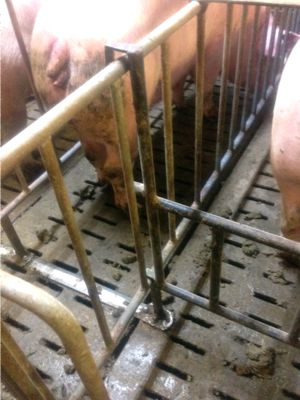
As progressive farmers we are always looking at improving our bottom line. In 2016 we decided to do a major overhaul of our quarantine barn to achieve better results. Knowing that eventually we would have to turn our main unit into loose housing we decided to introduce our gilts to this concept right away.
Along with group housing we also installed gilt crates for breeding. We quickly discovered after starting to use these crates that even with a short and narrower footprint they still left plenty of room for the gilts to move around. Usually this wouldn't be a big deal except that at the time of breeding when it made it difficult to maximize breeding potential. That's because during breeding, gilts moved substantially, turned around the odd occasion and at times even lost artificial insemination (AI) rods.
Using some leftover steel we had available we designed a "ghost gate" that could easily be placed behind the gilts while breeding them. The gates took maybe half an hour to an hour per gate to weld and cost less than $50 a piece since we used leftover steel. They easily slide behind the gilts and can be kept there for the duration of the breeding to promote nose-to-nose contact as well as decrease the chances of the gilts in the common pen pulling the AI rods out of the gilts being serviced.
We are not limited in lock in points for the gate since it can go behind each side bar on the crate. So body length of the gilt is not an issue. The gates aren't very heavy and when not in use are stored above the crates for easy access when needed.
We feel this innovation improves productivity, profitability and working conditions. The innovation has been welcomed by our employees. It makes daily breeding significantly easier and with less frustration. Their attention can go towards the actual breeding of the gilts rather than keeping the loose house swine away from the penned animals.
The gate is shown in photos attached. A video of this in action can be found at: https://youtu.be/PeOUhF0g32o.
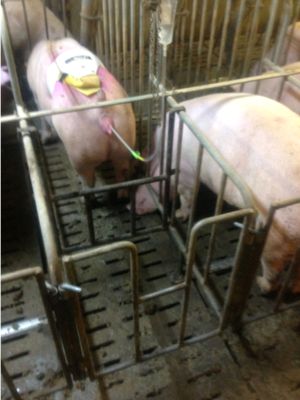
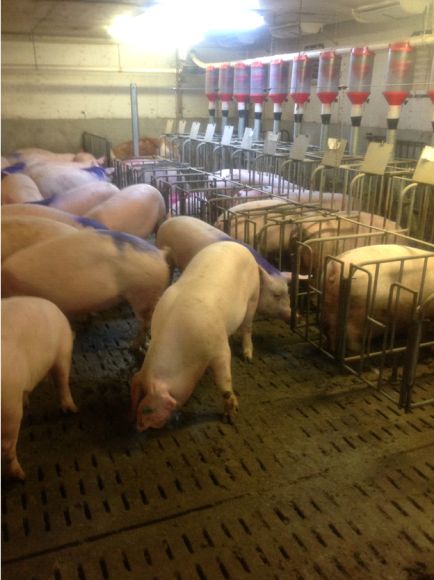
Isolation crate for loose housing system: Scott Hyshka, Production Manager, Sunterra Farms
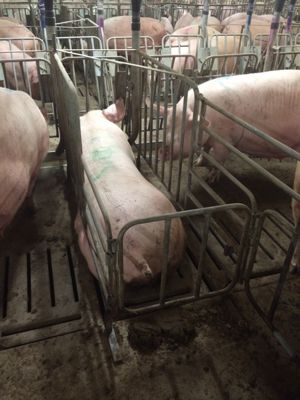
Mountain Vista Farm is a 4,000 sow farm east of Drumheller Alta. using competitive feeding shoulder stalls from 40 to 112 days gestation. The competitive feeding poses concerns of animal wellbeing and lost productivity that can result from aggression. There also is the issue with lost space from animals pulled from the loose pens that would not be refilled. The idea of the sick pen or collapsible crate within the loose pen was created to help resolve these issues.
The collapsible crate is in every loose pen. The pen can be opened to house an animal that requires segregation for additional nutrition or to have refuge from aggression (Photo 1, 2). If the pen is not needed it will remain folded up against the pen wall (Photo 3, 4).
The benefits of this are that the isolated animal remains in the loose pen with her pen mates. This allows the sow to re-enter the group when fit. The pen being within the loose pen does not require additional space in the farm to be set aside for sick or poor sows.
Win in future years
"The Aherne Prize is a popular one for the industry and one that will be continued in future years," says Ben Willing. "We hope that as producers see these prize winning innovations this year that they will be encouraged to enter their innovations at Banff Pork Seminars in upcoming years."
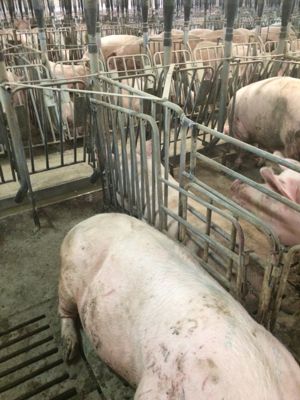

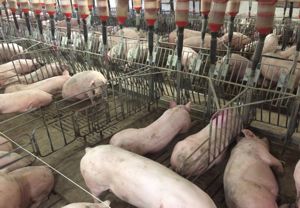
Return to the News Release Index
